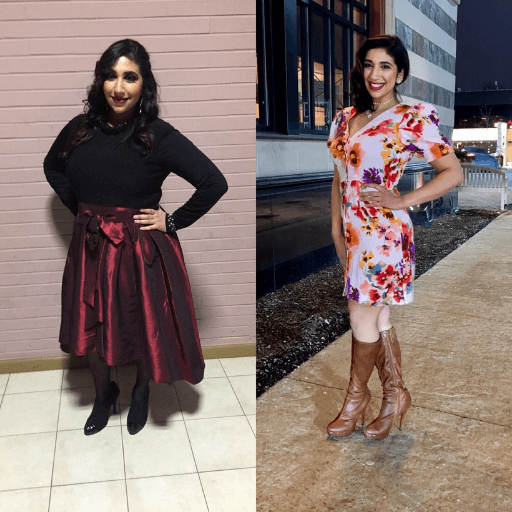The reason cheat meals are ruining your diet is NOT because of the foods you eat, but because of the domino effect that destroys your long-term weight loss goals. These are the ignored psychological and emotional impacts it has on you down the line.
WHY CHEAT MEALS SHOULD BE AVOIDED
First, let’s look into what having a cheat meal means.
There are usually two approaches people take when “cheating” on their diet:
1) Cheat Meals: This is a grace period of one meal a week where you allow yourself to eat whatever you want. They have meals with foods they normally wouldn’t have in their diet like burgers, pizza, chips, and ice cream.
They set one meal aside in the week, or a couple of them in the week that is dedicated to only eating these foods.
2) Full Cheat Days: Instead of just one meal, the entire day is dedicated to having these foods. Your diet during the week is healthy. You eat salads, vegetables, and grilled meats while avoiding high-calorie foods and snacks. For that one cheat day a week, you’ll eat all the food you weren’t able to have during the week.
In theory, you might think “this is a fantastic way to diet” but the concept of cheat meals or cheat days has several dangerous implications.
THE DANGEROUS IMPLICATIONS OF CHEAT MEALS
1. ONLY HEALTHY FOODS HELP YOU LOSE WEIGHT
In reality, this is far from true. This is because the most important thing for weight or fat loss is a calorie deficit. This was proven most famously by Mark Hubb, professor of nutrition at the University of Kentucky, who ate twinkies for two months while in a calorie deficit and lost 27 pounds.
You don’t need to eat healthy to lose weight, it’s all about calorie control. So you can have pizza and ice cream while dieting and still lose weight.
The opposite implication is equally dangerous.
2. CHEAT FOODS ARE BAD
As stated earlier, you could have these foods and lose weight, but also no food is better than another food. That isn’t to food all foods are the same, they’re not. Each food has different nutritional values and different caloric densities but no one food is bad all the time.
It also implies whenever you do have typical “cheat” foods; burgers, fries pizza, desserts, chips, and salty foods, you should feel guilty for having them because cheating isn’t a good thing and cheating in other contexts is frowned upon. If you’re cheating the system, cheating on your test, cheating the law. You’re doing something that isn’t allowed, so when you have a “cheat meal” you’re implying eating these foods at any point is a bad thing – which isn’t true.
In the short term this might seem inconsequential, but further on down the line, anytime you have these foods, you can’t fully enjoy them the way you want because you’ve reinforced negative feelings and associations with them.
SHORT TERM IMPACTS
Due to the restrictive nature of cheat meals, when you do finally have the green light to eat these foods you want to take full advantage of it. You waited all week for this moment and you likely won’t get a chance for another week. This puts cheat meals and the foods associated with them on a high pedestal of exclusivity.
When the time comes you end up overeating these foods and usually have way more than you should. In the short term, this harms your weight loss goals because you could be at a calorie deficit the entire week but on the one day you have a cheat meal, or you have a cheat day, you end up going over your calorie intake and take yourself out of the deficit for the week. Here’s a visual to show you what that looks like:

The foods you usually use for cheat meals are already calorically-dense foods. It doesn’t take a lot to go overboard with them. So it’s easy to put yourself out of a calorie deficit for the week. Then if you continue to repeat this pattern of eating healthy six days a week and having one cheat day you’ll never be in a calorie deficit long enough to see significant progress in the short term. Keeping you stuck for weeks, if not months!
LONG TERM IMPACTS
In the long term, if you continue these repeated bouts of extreme behavior – perfect dieting some days and full-on cheating other days – you’ll always struggle with moderation. You’ll never be able to enjoy a slice of pizza because on your cheat days you usually have four or five slices of pizza, and now that’s what it takes for you to be satiated and fully enjoy and immerse yourself in the pizza, whereas someone that understands moderation can have one slice of pizza and enjoy it fully and sometimes even more than the person that has five or six slices of pizza.
You’re also going to struggle emotionally around these types of foods. Whether it’s not feeling like you have control when you’re around these foods, having feelings of guilt after having them, or constantly facing an internal battle before having them you won’t be able to enjoy yourself fully because you feel bad for having them, which is a terrible way to live your life.
Also, because you’ve reinforced the idea of these foods being “bad” for so long, you’ll never truly have balance with your eating habits. You’ll never be able to maintain the weight you lose, because you’ll always struggle around these foods and you won’t know how to incorporate them into your diet in a sustainable way.
After the diet’s done, if you were to be successful in your weight loss following this approach, you’re sure to gain the weight back. You’re not going to be able to maintain that weight loss because now that you have the green light to have these foods all the time, you won’t know how to control yourself because you never learned how to while dieting.
You can’t have long-term sustainable weight loss following the cheat day/cheat meal model and you can’t enjoy the foods you like following this model either because you’ll always feel bad after doing it.
A BETTER WAY TO DIET
A better way to follow your diet is to have no restrictions on what you can or can’t eat (unless you’re allergic to those foods or they create digestive distress for you). to include the foods you like while still making weight loss progress or maintaining weight loss progress is by:
- Allowing access to any food at all times
- Knowing what you want and when you want it
- Knowing when it is enough
This is how we coach at StoopidFit, we want our diet while losing weight to be as similar as possible to the diet you’ll follow after you lose weight. So we don’t want to restrict any food choices. No food is ever off limits unless you’re allergic to them, they cause you digestive distress, or you don’t want them.
When you can lose weight while eating these foods, maintaining weight will be easy because you’ve been practicing it for so long. Ironically, when you allow yourself to eat whatever food you want, you don’t need as much to enjoy them or feel satisfied by them. You’re okay with having less because you have more access to them.
It’s similar to when you were a teenager, driving for the first time or if you didn’t have access to a car all the time you will find any reason to go anywhere. Just because you know these opportunities don’t always come up. So whenever you do have an opportunity to take the car to drive, you’re taking it, even if you don’t know where you’re going. Whereas when you’re an adult and you have your own car, you could drive anywhere you want and don’t really drive any time you want to or drive just for fun anymore, you drive when you need to, when you have to go somewhere when you need to get something, there’s more purpose behind the action.
It’s the same idea with cheat meals, if you don’t know when the next time you’re having this food is, you’re going to go overboard. You will take full advantage of that opportunity, and have as much of it as you can. By giving yourself the green light to have these foods whenever you want, you will enjoy them more because you know when you want them as opposed to thinking that you’re going to be missing out by not having them.
WHEN CAN YOU HAVE CHEAT FOODS?
Just because you don’t have any restrictions to what you eat doesn’t mean you should have it all the time. That’s a recipe for disaster! Instead, you should have those foods when you really want to have those foods. It starts with understanding what it means to want a specific food. It is an interesting thing, because you will think you want something but, really, you just like the idea of it, or it’s convenient for you.
A common example of this is around Halloween when you always have a bowl of candy present in your home. Whenever you walk by, you’re tempted to have a piece of candy. You are likely to grab one even though you don’t actually want it just because have it because it’s within arm’s reach.
You need to understand what it’s like to actually have a desire for a specific food. It’s not just about being hungry and driving by a burger joinr and thinking, “I should have that.” If you weren’t hungry and you wouldn’t want that burger then it’s not a good reason to have it. But maybe you had an itch for a burger and then ate an entire meal instead. You might be satisfied, but you still have a craving for a burger, THAT is when you know you actually want a burger. When nothing you eat or nothing that is around you can satisfy the desire for a food. Knowing when you want things is going to be important, this takes a lot of time to master, and it’s a skill and not something that everyone knows inherently.
It’s something that we’ve unlearned through normal everyday behaviors. Getting back in tune with your body and understanding when it is you want things once you do want them, and having them is going to be key in this process. In dieting, we want to eat as healthy as possible, as often as possible but there’s nothing wrong with having a burger, pizza, or dessert as long as you know you actually want it.
Once you decide that it is what you want you want to make sure that you’re eating enough. You don’t want to over-consume. You don’t want to feel terrible after eating it because you had so much. In our culture, in western society we’re very much “more is better” but that’s not always the case.
There’s a phrase I like to use for my clients that struggle with overeating:
“enough is as good as a feast”.
If you’re at a buffet, where you have access to everything around you, having 10 plates of everything just because you can doesn’t make it better for you. If you grew up with really frugal parents, they’ll tell you to eat as much as you can, which is not a great behavior to go through because you never gain the awareness to know when enough is enough.
You don’t need more to be satisfied, you just need enough to be satisfied. If you left the buffet having eaten one plate of food, but you ate all your favorite foods and you ate to contentment. You had a better time than the person who ate ten plates of everything and is in a food coma afterwards. That’s how you want to approach the situation when you’re having the foods you want or having the foods you normally label as bad, unhealthy, or fattening, you want to enjoy it.
The purpose of having these foods in the first place is to enjoy them because they taste great. These aren’t foods that are serving a major purpose in elevating the health of your body. Eating ice cream isn’t going to make you bigger, faster, stronger, or improve your sleep. You want to have it because it tastes good, you can enjoy the first bite just as much as you can enjoy the 10th bite but you have to be present in your meal while you’re eating, and you have to take the time to truly be there, taste the ice cream while it’s in your mouth. You have to feel the chews and really embrace the eating experience while eating as opposed to mindlessly eating as much as you can, and trying to keep the taste in your mouth as long as possible, savor the taste while it’s there, and you’re able to have enough without needing more.
It’s something I’m definitely better at than I was before, I used to be one of those people that always has to finish what’s on their plate, partly because of how I was raised, an odd behavior I had to rewire. Now if I don’t want something, I don’t have it. If I eat half the plate and I feel good and content then I’m done.
I don’t need to eat more, I can have the rest later. These are the little habits you do in your meals throughout the day, throughout the week, that really add up to a healthier relationship with food to better energy, to a better mood, to a better body as well. This doesn’t get talked about enough and it’s a skill that takes time to master. It’s a skill that needs to be learned and honed and likely you need to unwire and unlearn old habits and skills that led you to this point.
It’s not something that you can easily master, you might need to re-reference a number of times to remember what you need to do. The goal is to go through the three-step process that was laid out.
- Make sure no foods are off limits
- Have foods when you actually want the foods, not because they’re convenient
- Know when the amount you’re eating is enough. Practice portion control and listening to your body so you can enjoy these foods without needing more







